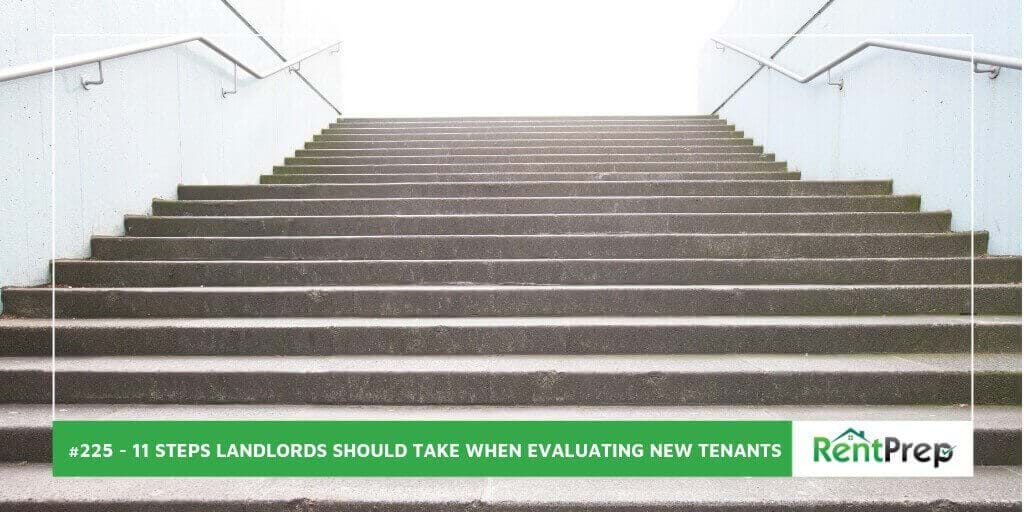
This week we discuss 11 steps landlords should be taking when evaluating new tenants. This is based on an article from Forbes.com
Click here to listen on iTunes.
Click the Big Green Play Button to Listen to the Podcast
Eric runs through these 11 tenant evaluation tips and provides further context on each one.
Check out this episode of the RentPrep For Landlords podcast
Subscribe: Apple Podcasts | Android | Stitcher
Join our Facebook Group of over 8,000 landlords and property managers
Show Notes:
0:00 – 0:46 – Intro and opening to today’s episode and teeing up the Forbes article on 11 tenant screening tips.
0:47 – 1:27 – Michael J. Polk – Have a system and follow it. Tools like Google Forms help to weed through potential tenants to fit ones that fit your criteria.
1:28 – 4:25 Tip 2: Take previous landlords seriously. Don’t be afraid to ask, “Can you recommend this tenant without any reservations?” Previous landlords are an excellent resource.
4:26 – 5:35 How to perform tenant screening calls
5:36 – 6:06 Tip 3: Assess the pattern of behavior. Ask for at least 3 previous places that they’ve lived, because sometimes bad tenants don’t have bad credit or evictions. Call previous landlords and ask about things like noise complaints.
6:07 – 7:28 Tip 4: Scrutinize their history against written criteria, criteria for residency. Eviction search mention.
7:29 – 8:30: Tenant screening criteria resources
8:31 – 10:13 Tip 5: Hold in-person interviews. Look them in the eyes. Make verification calls. Bad credit can happen to anyone. Make this a part of your screening process. Be safe at in-person interviews. Consider bringing another person, meeting in a public place, doing an open house, or asking for a photo ID before meeting.
10:14 – 12:35 Tip 6: Have a bullet-proof lease agreement. Constantly update this lease to reflect your preferences and needs as a landlord. Ask a veteran company for a copy of their lease and tweak it to fit your needs. Have legal counsel to help you with your lease. Local landlord associations are good to find leases regarding rules of your township.
12:36 – 14:43 Tip 7: Check their social media. Do searches to uncover dual accounts. You don’t have to agree with their lifestyle, but it’s good to see what they are comfortable posting online. Search county records for previous landlords to make sure things match up.
14:44 – 17:00 How to search county records for landlords.
17:01 – 17:08 Tip 8: Make sure to screen all applicants over the age of 18. Everyone has a unique history. Screen long-term tenants when a child still living at the property turns 18.
17:09 – 19:01 Tip 9: Think like a detective. Credit checks are a must, but so are criminal history checks, especially those involving drugs. This will help to avoid potential issues in the future.
19:02 – 20:33 Tip 10: Review compliance to fair housing laws in combination with state and local regulations. This ensures that you are able to avoid unnecessary fines. Make sure you understand the laws. Stay up to date with local regulations.
20:34 – 21:47 Tenant screening laws.
21:48 – 22:56 Tip 11: Use a third party service. Cuts liability and they can do a thorough job. You can do it on your own, but this is better. They have to pass security compliance standards that you wouldn’t typically handle. You won’t have to handle copies of secure documents. Adverse actions give the information of the background screening service not the landlords. Do your due diligence.
22:57 – 26:43
26:44 – Eric finishes up the podcast. Tune in next week.
Resources Mentioned:
Forbes article that the episode is referencing:
https://www.forbes.com/sites/forbesrealestatecouncil/2018/09/14/11-steps-landlords-should-take-when-evaluating-new-tenants/#3cf622a15b17
Tenant Screening Tutorial on RentPrep site:
https://rentprep.com/tenant-screening/
Tenant Screening Criteria:
https://rentprep.com/tenant-screening/tenant-screening-criteria/
Tenant Screening Laws:
https://rentprep.com/tenant-screening/tenant-screening-laws/
How to look up property records:

